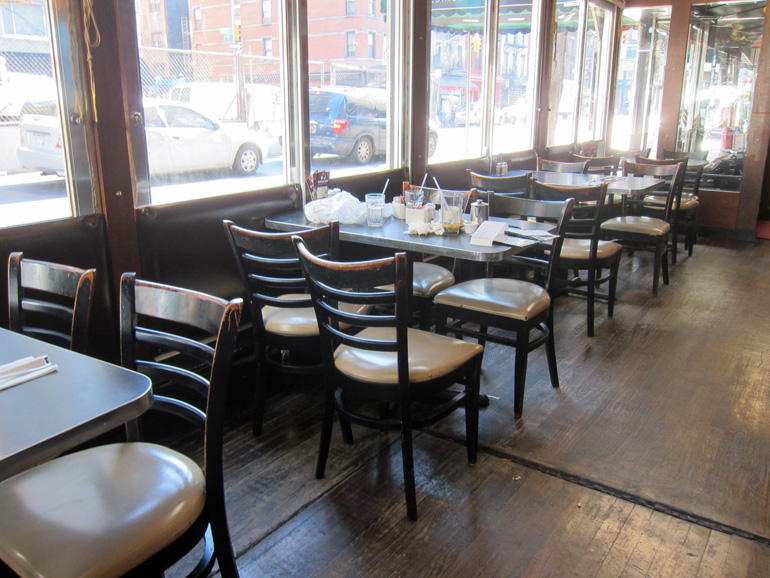Gotham Diary:
Not Even Translated
4 January 2013
Having done almost all of the cooking yesterday, I was in the kitchen for another reason this afternoon: polishing silver. (I keep telling myself that this party is going to be a “rout,” but there are limits to informality.) Since we’ll be using plastic forks, there wasn’t much to polish — just a couple of candlesticks and suchlike — but to ease the drudgery, I brought the DVD boombox into the kitchen and sat it atop the gag-gift oversized crystal beer mug, engraved “R J Our Hero,” the one souvenir of my working life that I’ve held on to, that sits on the counter holding lobster crackers. (You’d think we ate much more lobster than we do.) I slipped in North by Northwest; hey, it’s my birthday! Now, the DVD boombox has this annoying habit of displaying subtitles whether you want them or not. Sometimes, all you have to do is hit the “subtitle” button on the remote. Sometimes, you have to go into the DVD’s root menu and choose “No subtitles” as a language. It’s a bit of pain. North by Northwest turns out to be the first kind of disc. The subtitle button does not raise the “invalid key” message, but it does rotate through the available languages, which on this disc are English and French (and, thank heaven, “off”). For some goofy reason, I decided to go with French, even though, on the boombox’s tiny 7″ screen, the subtitles take up a lot of real estate. I wouldn’t be watching the movie much more than I usually do; I would be polishing silver.
I certainly hope, though, that they have better subtitles in France. I can’t imagine a Truffaut making a big deal about Hitchcock on the basis of the utterly witless rendering offered by Warner Brothers. It completely suppresses the dialogue’s pervasive sophistication, remarkable today and astounding for 1958. Also sacrificed is Roger O Thornhill’s crisp, patrician outlook. It’s easy to see that there would be no way to translate what Cary Grant says when he runs into Eva Marie Saint, James Mason, and Martin Landau at the auction house: “Now, here’s a picture that only Charles Addams could love.” (Astounding, as I say. Who but New Yorker readers knew about Chas Addams in the Fifties?) But surely more effort might have been made with the moment of Cary Grant’s easygoing sarcasm, when he makes it clear, in the middle of the phone call to his mother from jail, that she has just said that there can’t really be anybody so unfortunate as to be called Emil Klinger, by replying, “No, I don’t believe it, either.” The subtitle is unadulterated mec: “Quel nom, hein?” And, at the other end of the movie, in the scene in the living room of the cantilevered house, James Mason says to Martin Landau, “Jump in, Leonard. The champagne’s fine.” The moment is so highly charged with sexual competition that you might think that skinnydipping is implied. But not in French. “Prenez un peu de champagne, Leonard.”
It has been a while since I’ve seen North by Northwest — six months or more, long enough for the Bernard Herrmann score to sound so fresh that I saw how much Wagner there is in it. (The Ring particularly.) I don’t mean motifs, but rather the orchestration. And yet, as always, it was the more minimal music that appealed to me, especially the passage, used first at Union Station and then at the cantilevered house, in which a bell-like instrument (I ought to know which one) climbs up and down the scale at an understated pace while the strings screw simple arpeggios beneath it.
And to think: I saw North by Northwest when it came out — but it’s still showing me things that I never quite saw before. (Such as, just one example, the contrast between Eva Marie Saint’s gently swaying pageboy, which would not be terribly dated today, and the United Nations receptionist’s no less blonde but much less interesting and totally Fifties tight perm. I don’t think that there’s another movie in which Hitchcock pitches the sexy so clearly against the respectable.)
Now it is time to go to bed and rest up for the party.

